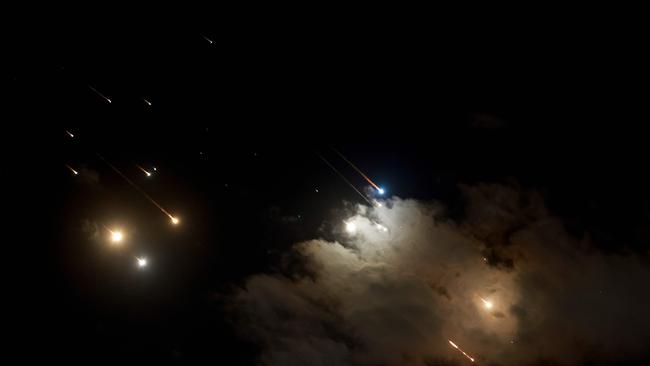Israel plots strikes on Iran ‘to topple regime’
Benjamin Netanyahu believes airstrikes could weaken the two pillars of the Islamic regime that have been instrumental in putting down mass protests against it.

Israel has been consulting the US on its retaliation for the salvo of nearly 200 Iranian missiles launched against it this month, narrowing down targets to Iran’s Islamic Revolutionary Guard Corps and its volunteer paramilitary force. There is a third, more indirect, goal: encouraging regime change.
Benjamin Netanyahu, the Israeli prime minister, hinted as much in a video statement, billed as an address to the Iranian people, several days before Iran’s missile attack. The speech in English was perhaps aimed at western countries, and the Iranian opposition, which is based abroad, critics said.
“Don’t let a small group of fanatic theocrats crush your hopes and your dreams … The people of Iran should know – Israel stands with you,” Netanyahu declared.
“When Iran is finally free – and that moment will come a lot sooner than people think – everything will be different.”
Netanyahu hopes that Israel’s future airstrikes will help to weaken the Islamic Revolutionary Guard Corps (IRGC) and the Basij paramilitary force, two pillars of the Islamic regime that have been instrumental in putting down mass protests against it.
The IRGC is both an elite military force and a dominant presence in Iran’s economy, while the Basij, a loyalist militia regularly used as foot soldiers, has branches across the country.
“They’re planning to hit them hard,” a western official said this week of Israel’s plan, adding that this could encourage Iran’s opposition.
A realist, Netanyahu would not believe that one wave of airstrikes, or even several, would topple the regime by encouraging a popular uprising.
But some in Israel’s leadership, including the far-right coalition ministers who support harsh action against Iran, believe that this is a defining moment that can change the power balance in a region that feels caught between the US and Israel on the one hand, and Iran and its “axis of resistance” on the other.
That view has been reinforced by the rapid decapitation of Hezbollah, Iran’s most powerful asset among the network of proxies and allies it had cultivated for decades to counter Israel.
Firas Maksad, senior fellow with the Middle East Institute think tank, said: “The Biden administration and the Israelis have come to a general understanding that the first stage of Israeli response will be limited to military and the IRGC and Basij, and they will stay away from nuclear and oil facilities. Going after the Basij and IRGC will, some hope, put further strain on the relationship between them and the people.”
Although the US may also not believe that the Islamic regime in Iran could be immediately threatened by a popular revolt, it may have indulged the idea to persuade Israel not to strike nuclear and oil facilities.
The US wants to avoid attacks on these assets for fear of escalation: either Tehran accelerating its enrichment of uranium to create a nuclear bomb, or to lash out against oilfields in the region, driving up prices before next month’s presidential election and giving Donald Trump, the Republican candidate, more fodder for his campaign.
Any attack by Israel is also likely to draw further reaction from Iran. “That needs to be thought of as the first salvo,” Maksad said. “There will be an Iranian response and that will put us past the elections in the US. At that point, Netanyahu will have more flexibility to respond in a more expansive way.”
Israel’s recent successes against Hezbollah in Lebanon, including sabotage attacks that reduced the Shia group’s fighting strength and airstrikes that have killed key figures, including Hassan Nasrallah, its leader, could embolden the hawkish ideologues in Netanyahu’s governing coalition to further expand the war against its arch-enemy.
The Israeli security and intelligence agencies, which have studied Iran for decades, may also not be convinced that military or covert attacks could overthrow Ayatollah Khamenei.
“I would be surprised if the wider security apparatus are on board for that – it’s an impossibility for Israel to have that level of success,” Sanam Vakil, Chatham House’s Middle East and North Africa program director, said.
Opponents of Khamenei’s repressive Islamic regime far outweigh its conservative supporters. Turnout in parliamentary elections and a presidential election this year registered record lows and calls for boycotts, two years after the repression of mass protests against the treatment of women.
The trend may point to a growing conviction among Iranians that regime change, and not reform, is required, but few would welcome it at the behest of a foreign power, analysts say. And Iran, feeling threatened, could crack down pre-emptively on any signs of dissent.
The Times






To join the conversation, please log in. Don't have an account? Register
Join the conversation, you are commenting as Logout